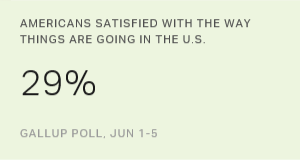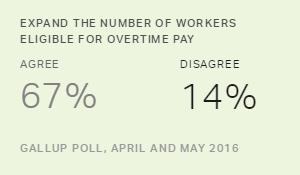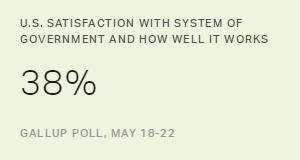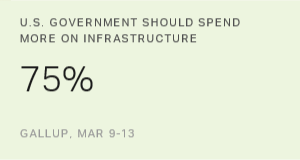Examining the existing data showing what the American public is worried about and what their priorities are for their next president, I come away with this conclusion: The key public concerns in the U.S. today are the economy, jobs and dysfunctional government.
The first two are interconnected, as is obvious -- but that's actually a key point. "Unemployment/Jobs" is the biggest individual category of economic responses outside of "the economy" in general when we ask the public to name the facing the nation, underscoring Americans' core concerns about jobs. We know from asked in the past that "creating jobs" comes back to us as the top response category when we ask Americans how to fix the economy. And we know from studying the public's responses to a long, long list of policy proposals that those dealing with the creation of jobs almost always percolate up to the top of the rankings.
There are a number of approaches to the jobs issue, including those that deal with access to jobs and those that deal with the compensation tied to specific jobs. One example of the latter comes from Switzerland, where a was held several years ago on the proposal that the government limit the compensation available to those who held CEO jobs to no more than 12 times the compensation of the lowest paid employee in that same company. That referendum failed, but it exemplifies a whole category of approaches that include limiting income on the top end through Switzerland-type measures or -- more commonly -- through high taxes, or raising income on the bottom end, often through initiatives related to minimum wage. Examples of the "access" approach involve a whole host of efforts to limit discrimination in access to jobs, institute affirmative action for access to jobs, expand training programs to qualify people for jobs, limit or eliminate tuition for college, and so forth.
All of these circle the underlying fact that there have to be jobs to begin with for these proposals to be relevant. That is, discussions surrounding access to jobs and the compensation tied to jobs assume that those jobs exist. And this is where my reading of public opinion shows that the public is most focused on the exhortation: "Show me the jobs!"
Donald Trump by a modest margin -- 52% to 45% -- when we recently asked Americans whether he or Hillary Clinton would do a better job handling jobs and employment. He won by a slightly larger margin (53% to 43%) on the economy more generally. Trump's campaign materials place a direct focus on jobs, and he claims that he would be the "jobs president," telling various audiences without much in the way of specifics that he would bring back lost jobs in their region (e.g., coal mining jobs). His initiatives for building a wall between the U.S. and Mexico and rescinding trade treaties -- both unpopular in and of themselves, based on our data -- are ultimately aimed at creating more jobs.
Clinton's economic focus is more of an effort to change access to jobs, except for her interest in spending more money on infrastructure and scientific research. She also focuses on compensation attached to jobs with her support for labor unions. But she is not as direct in putting forth the idea of creating jobs as is Trump.
Bernie Sanders has been the candidate whose approach to jobs in many ways resonates most with the American public -- basically following a Franklin D. Rooseveltian, Depression-era model and harnessing the power of the government to create millions of jobs.
How Trump would actually become the "jobs president" and how Sanders would pay for all of the job creation are not clear. But the key point here is that both of these candidates are attempting to directly address one of the specific issues about which the public cares most.
All of this ties into the third issue that scores as a top problem for Americans today: the extraordinarily low confidence they have in their elected officials and government. Our new confidence in institutions data, to be released shortly, show -- again -- that Americans have less confidence in Congress than in any other institution tested. (The fact that the public has the most confidence in the military and the least in Congress does give one pause for thought.)
The presidential candidates might not feel that fixing the legislative branch is their responsibility, but any attempt to use government to help address the critical economy/jobs priority is, by definition, going to involve Congress and the bureaucracies around it. The public wants this as a focus.
As I discussed , Ted Cruz and Sanders have been the candidates focused most on Congress in their campaigns, from different perspectives. Cruz basically wanted to dismantle a lot of government, reflecting his inherent antipathy for the role of the institution in society. Sanders strongly believes in the role of government in fixing wrongs and coming to the aid of the less powerful and dispossessed, but he has evinced a dislike for how the government currently functions (even though he is a sitting senator).
Neither Trump nor Clinton has spent as much time addressing government and its perceived dysfunctions as have these other candidates, but the data clearly give them a mandate from the public to do so.
Both candidates will have a lot to talk about as their campaigns blaze on through the summer, the conventions and the debates leading up to the election. Both have many constituents they will attempt to please. Neither can go wrong by firmly focusing on the economy, jobs and fixing the government.




